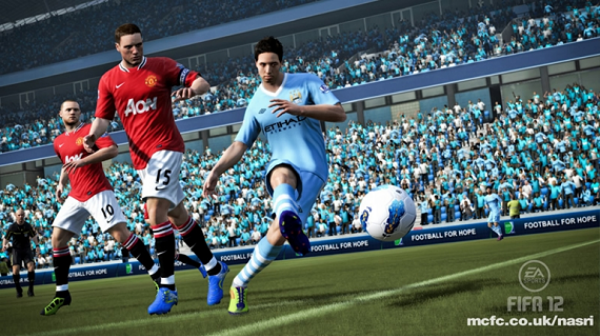Michael Cox
The Guardian, Monday 30 April 2012
Article history
The opportunity for Manchester United to avenge Manchester City's 6-1 win at Old Trafford in October is the inevitable context for this match. In tactical terms, however, City's 1-0 FA Cup semi-final victory at Wembley last April is a more relevant previous encounter.
Yaya Touré scored a winning goal that brilliantly epitomised the two teams' styles: the Ivorian stormed forward to intercept a short Michael Carrick pass intended for Paul Scholes, drove past the United defence, and finished past Edwin van der Sar. It was a fitting decider in a game primarily about tempo – United wanted to be slow and relaxed in possession with Carrick and Scholes, while City were about the power of Touré, Nigel de Jong and Gareth Barry. After half-time, City turned the game into a ferocious midfield battle, with United's struggles demonstrated by Scholes's red card.
When the game was timid in the first half, Sir Alex Ferguson's side dominated, and the best two opportunities were wasted by Dimitar Berbatov. Despite being the Premier League's joint top scorer last season, Berbatov has barely featured this year. The reason, according to his agent Emil Danchev, is that Ferguson "wants to change the style of play of United, to put more speed into the game". That explains why Berbatov is behind Danny Welbeck and Javier Hernández in Ferguson's pecking order.
Berbatov is one of the more thoughtful footballers and might have pondered the contradiction in United's style this season when glancing at their central midfield. In that department, United are slower, more patient, more sideways than ever before now that Scholes and Carrick have re-emerged as Ferguson's first-choice pairing. It is quite a contrast from the beginning of the season – Carrick did not start any of United's first 11 league games, even when fit enough to make the matchday squad, but has been in the first XI in the subsequent 24. Scholes spent the first half of the season in retirement, yet has missed only one league game since his surprise return – United's only defeat in that time, away at Wigan Athletic.
Ferguson appeared to be building a midfield with the opposite characteristics – the brilliant turnaround against City in the Community Shield, winning 3-2 having been two goals down at half-time, came once Tom Cleverley was introduced to give thrust to the midfield. Two of Cleverley, Anderson or Darren Fletcher comprised the midfield duo for the first seven games of the season, and United were more mobile and vertical than we've seen for many years without a deep-lying passer in their side. Later, as those three players all struggled for fitness, the likes of Park Ji-Sung, Rafael da Silva and Phil Jones deputised, primarily bringing the ability to charge up and down the pitch relentlessly.
Reverting to the calmness of Scholes and Carrick has largely been a successful improvisation but United are back to the situation of last year's semi-final. They can control the game brilliantly when playing at their own tempo, yet can be overrun when the opposition increases the pace. That was partly the problem last week against Everton, with Marouane Fellaini pushed high up and closing down robustly.
City have also evolved from last year's semi-final and are less of a physical force. De Jong is now a reserve, with Touré played deeper alongside Gareth Barry, and Sergio Agüero's introduction has made City a more intricate side. Yet they also have great energy across the pitch, with Agüero and Carlos Tevez both adept at making well-timed runs, and also hard-working when the opposition have possession.
Therefore, rather than the brute force of last April, the best way for City to pressure Scholes and Carrick will be to crowd attacking players around them. If they are unchanged from the side that defeated Wolves last weekend, City will have Tevez and Agüero up front able to drop into deep positions, plus David Silva and Samir Nasri cutting into central zones from wide. Combine that with Touré and Barry pushing up, and United could be drastically overrun in the centre of the pitch.
In previous seasons Ferguson would have unquestionably dropped a forward and played an extra midfielder in a game of this magnitude but that has happened only once in the really big away games in the league this season, away at Liverpool – that was when Wayne Rooney was unavailable, and Fletcher was. The Scot was United's big game player, and featured in United's last two league wins over City – the 1-0 two years ago when Scholes headed the winner, and the 2-1 last season won by Rooney's overhead kick. On both occasions, Fletcher's energy was preferred to Carrick's precision. For this match, the third central midfielder could be Jones, Cleverley, Ryan Giggs or Park Ji-Sung – but that is a choice between two players who lack experience, a veteran who doesn't offer much more mobility than Carrick or Scholes, or a player dramatically out of position.
If Ferguson does not go for a third central midfielder, Rooney has a huge role to play. The battling qualities United lack with Scholes and Carrick have been outsourced higher up the pitch to Rooney, and his defensive contribution will be as vital as his attacking invention. He might even drop deeper and play as more of a midfielder.
Context plays a big part in any tactical battle; here, Mancini needs a win, while Ferguson would accept a draw. In a clash between a frenetic City and a patient United, that difference will only exaggerate the contrast in style.









